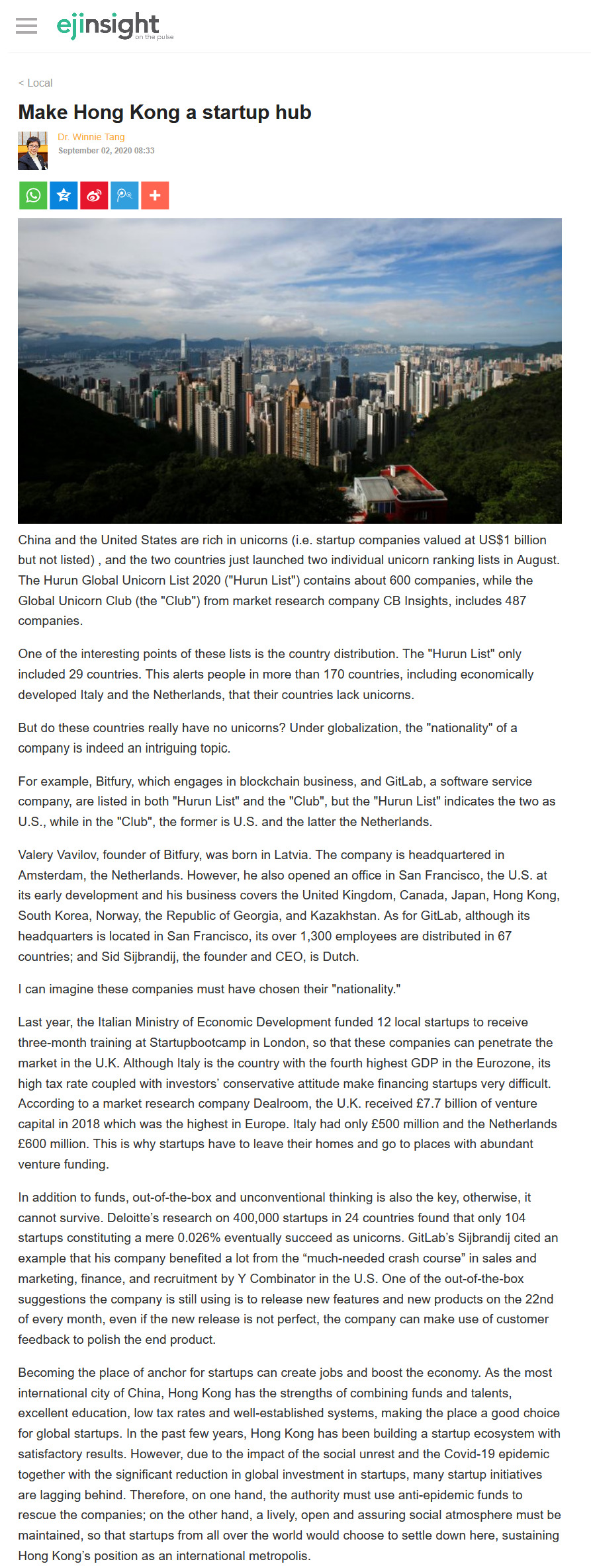網上版請按此

Make Hong Kong a startup hub
China and the United States are rich in unicorns (i.e. startup companies valued at US$1 billion but not listed) , and the two countries just launched two individual unicorn ranking lists in August. The Hurun Global Unicorn List 2020 ("Hurun List") contains about 600 companies, while the Global Unicorn Club (the "Club") from market research company CB Insights, includes 487 companies.
One of the interesting points of these lists is the country distribution. The "Hurun List" only included 29 countries. This alerts people in more than 170 countries, including economically developed Italy and the Netherlands, that their countries lack unicorns.
But do these countries really have no unicorns? Under globalization, the "nationality" of a company is indeed an intriguing topic.
For example, Bitfury, which engages in blockchain business, and GitLab, a software service company, are listed in both "Hurun List" and the "Club", but the "Hurun List" indicates the two as U.S., while in the "Club", the former is U.S. and the latter the Netherlands.
Valery Vavilov, founder of Bitfury, was born in Latvia. The company is headquartered in Amsterdam, the Netherlands. However, he also opened an office in San Francisco, the U.S. at its early development and his business covers the United Kingdom, Canada, Japan, Hong Kong, South Korea, Norway, the Republic of Georgia, and Kazakhstan. As for GitLab, although its headquarters is located in San Francisco, its over 1,300 employees are distributed in 67 countries; and Sid Sijbrandij, the founder and CEO, is Dutch.
I can imagine these companies must have chosen their "nationality."
Last year, the Italian Ministry of Economic Development funded 12 local startups to receive three-month training at Startupbootcamp in London, so that these companies can penetrate the market in the U.K. Although Italy is the country with the fourth highest GDP in the Eurozone, its high tax rate coupled with investors' conservative attitude make financing startups very difficult. According to a market research company Dealroom, the U.K. received £7.7 billion of venture capital in 2018 which was the highest in Europe. Italy had only £500 million and the Netherlands £600 million. This is why startups have to leave their homes and go to places with abundant venture funding.
In addition to funds, out-of-the-box and unconventional thinking is also the key, otherwise, it cannot survive. Deloitte's research on 400,000 startups in 24 countries found that only 104 startups constituting a mere 0.026% eventually succeed as unicorns. GitLab's Sijbrandij cited an example that his company benefited a lot from the "much-needed crash course" in sales and marketing, finance, and recruitment by Y Combinator in the U.S. One of the out-of-the-box suggestions the company is still using is to release new features and new products on the 22nd of every month, even if the new release is not perfect, the company can make use of customer feedback to polish the end product.
Becoming the place of anchor for startups can create jobs and boost the economy. As the most international city of China, Hong Kong has the strengths of combining funds and talents, excellent education, low tax rates and well-established systems, making the place a good choice for global startups. In the past few years, Hong Kong has been building a startup ecosystem with satisfactory results. However, due to the impact of the social unrest and the Covid-19 epidemic together with the significant reduction in global investment in startups, many startup initiatives are lagging behind. Therefore, on one hand, the authority must use anti-epidemic funds to rescue the companies; on the other hand, a lively, open and assuring social atmosphere must be maintained, so that startups from all over the world would choose to settle down here, sustaining Hong Kong's position as an international metropolis.
Dr. Winnie Tang
Adjunct Professor, Department of Geography, Faculty of Social Sciences and Faculty of Architecture, The University of Hong Kong